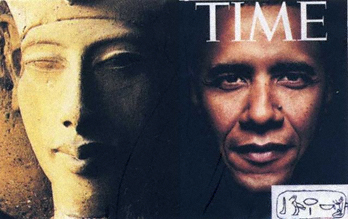
A photo of President Obama with a sculpture of the "Heretic King", Akhenaten, whose aesthetics and monotheistic views challenged the artistic religious canons during ancient Egypt's New Kingdom.
The Etymology of the name Barak and Some Word Games
© Amir Bey, 2009
Special For THE NEW TIMES HOLLER!
It is often said that Barack Obama's first name is Ki-Swahili (Swahili). Actually it is a name that has its origins back to Ancient Egyptian, the language
of the pharaohs, an early branch of what is called the Afro-Asiatic
language family. Arabic and Hebrew are also Afro-Asiatic languages. The word "Barak" means "Blessing", in all three languages.
Here are the hieroglyphs for that word as they would be written in Ancient Egyptian:

Languages that were written
in pictures like ancient Egyptian and Chinese often wove composite ideas in their words.
The signs for "Barak" give an indication of its meaning: reading from the left, the first
two form the word "Ba", which meant "Soul"; the third sign, the disk-like shape is an r
sound, and with the vertical line underneath, it represented both the r sound and a mouth;
the sign to its right is a bowl, and represented k sound, and also meant the second person
masculine "your" or "thy"; and the kneeling figure with its hands upturned is called a determinative, and indicates the sense of the word, which in this case represents supplication or worship. One possible meaning of "Barak" in this form could be that a blessing was viewed as being "You speak soulfully" your (k) verbal (r-mouth) praise (the figure) to the soul (Ba) or finally, to speak in a worshipful way, to bless.
To say that President Obama's name is derived from this Ancient Egyptian word is based on
it being possibly the earliest written appearance of that word. While we can't say that
it was an Ancient Egyptian name, the name stems from a word that may predate pharonic Egypt,
and it could be much older. Its origin appears to be North-African or possibly North East
African. The Kiswahili form, which occurred in the Common Era, is actually written "Baraka",
as in the writer Amiri Baraka's last name. It is a loan word that was introduced by the Arabs
when they traded in East Africa. While Barack Obama is named after his father who was born and
raised in Kenya as a Moslem, the pronounciation "Barak" is an Arabic form of the name, and is also
spelled that way in its Hebrew form.
WORD GAMES
Well, call me an Egypto-Obamaphile if you like, but I decided to have some fun with his name
and while looking to see if I could also come up with a combination of words to phonetically
spell his middle and last names and also create some kind of word-image puns, which happens
in Ancient Egyptian, Chinese and other pictorially written languages.
In formal presentations the Ancient Egyptians wrote names in a lozenge-shaped circle they
called a mnsh and what the French called cartouches, because they reminded them of their
bullet cartridges; present-day Egyptologists also use that term (what a reference!).
Ancient Egyptian was written phonetically and with few vowels; President Obama's first name would be written as:

I couldn't find an Ancient Egyptian word that was phonetically related to his middle name, Hussein,
which means "Good", and "Good Looking" in Arabic, so I composed a name that phonetically
spelled it, but whose combination of signs created a play on images and words:
 which suggests "Oil that brightens". which suggests "Oil that brightens".
His last name comes out to be:
 ,
or "The quail who sees the soul". ,
or "The quail who sees the soul".
Sources:
E.A. Wallis Budge, An Egyptian Hieroglyphic Dictionary*
And
Rainer Hannig, Grosses Handworterbuch Agyptisch-Deutsch (2800-950 v.Chr.)
*While Budge doesn't always list his sources, and is not always reliable, the amount of work he produced left a vast amount of material,leaving the most extensive English-Egyptian language dictionary.
I always double-check his work against Hannig's comprehensive dictionary which also comes in Deutsch-Agyptisch, and Raymond O Faulkner's Middle Egyptian which are reliable sources. |
|
|